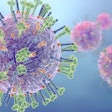
A systematic review and meta-analysis found that individuals previously infected with COVID-19 have an 88% lower risk of hospitalization or death for at least the following 10 months compared with those not previously infected.
The study, published February 16 in the Lancet, comprehensively assessed the duration of protection after natural infection, and how effective that protection is against different variants.
“Vaccination is the safest way to acquire immunity, whereas acquiring natural immunity must be weighed against the risks of severe illness and death associated with the initial infection,” University of Washington School of Medicine lead author Dr. Stephen Lim noted in a statement.
The researchers conducted a review and meta-analysis that included 65 studies from 19 countries. They evaluated the effectiveness of past infection by outcome (infection, symptomatic disease, and severe disease), variant, and time since infection. Studies examining natural immunity in combination with vaccination -- called hybrid immunity -- were excluded.
Data analysis from 21 studies estimated that protection against reinfection from a pre-Omicron variant was about 85% at one month post-infection; this fell to about 79% at 10 months. Protection from a pre-Omicron variant infection against reinfection from the Omicron BA.1 variant was lower: 74% at one month, declining more rapidly to 36% at 10 months. However, five other studies reporting on severe outcomes (hospitalization and death) found that protection remained universally high for 10 months: 90% for ancestral, Alpha, and Delta variants, and 88% for the Omicron BA.1 subvariant.
Six studies evaluating protection against Omicron subvariants BA.2 and BA.4/BA.5 indicated significantly reduced protection when the prior infection was a pre-Omicron variant. But when the prior infection was from Omicron, protection was maintained at a higher level. The weaker cross-variant immunity with the Omicron variant and its subvariants likely reflects the mutations which allow them to escape built-up immunity. Given that Omicron and its subvariants are estimated to have infected nearly half of the global population between November 2021 and June 2022, these studies underscore the importance of continued assessment of natural immunity against emerging variants, and the protection provided by hybrid immunity. Researchers say taking both natural immunity and vaccination status into consideration provides a fuller picture of an individual’s immunity profile.
The analysis suggests that the level and duration of protection against reinfection, symptomatic disease, and severe illness provided by ancestral, Alpha, Delta, and Omicron BA.1 infection is equal to that provided by two doses of the mRNA vaccines Moderna and Pfizer-BioNtech. Nevertheless, the researchers emphasize the importance of vaccination programs in protecting high-risk populations, including those over 60 years of age, those with comorbidities, those that have not been previously infected, the unvaccinated, and those who were infected or received their last vaccine dose more than six months ago.



















